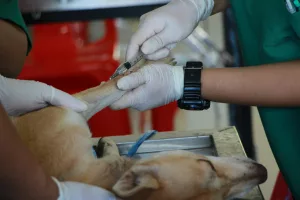Dogs sneeze for many reasons, just like humans. A sneeze from your dog every now and then is typically harmless, but if your dog is sneezing excessively or frequently, it might be a sign that something more serious is going on. Sneezing can range from a simple reaction to dust or pollen to a sign of an infection, allergy, or even a foreign object lodged in your dog’s nose.
In this article, we’ll explore the possible causes behind your dog’s sneezing, explain how to determine whether a vet visit is needed, and provide tips on how to help your dog feel more comfortable.
1. Normal, Harmless Sneezing
Not all sneezing is cause for concern. Dogs, like humans, can sneeze due to simple, everyday reasons that don’t indicate any health problem. Sneezing can be triggered by an irritant such as dust, pollen, or smoke, or it can even be a part of your dog’s regular communication or play behavior.
Playful Sneezing
Dogs often sneeze while playing, and this is completely normal. It’s a way for them to signal that they are having fun and that their actions are not aggressive. This type of sneezing, often referred to as play sneezing, is usually short and frequent during moments of excitement or interaction with other dogs or people.
Signs of Play Sneezing:
- Happens during or right before playtime
- Accompanied by other playful body language, like wagging tail, bowing, or running
- Quick, short sneezes, rather than prolonged sneezing fits
Environmental Irritants
Just like humans, dogs are susceptible to sneezing when exposed to environmental irritants like dust, strong smells, smoke, or air fresheners. If your dog sneezes occasionally in response to these stimuli, it’s usually not something to worry about.
Common Environmental Irritants:
- Smoke from cigarettes, fireplaces, or candles
- Dust or pollen in the air
- Strong chemical odors, such as cleaning supplies or perfumes
What to Do:
- Make sure your dog’s living space is clean and free of dust or debris.
- Avoid smoking or using strong chemicals near your dog.
- Ensure proper ventilation if you’re using cleaning products or air fresheners.
2. Allergies
Dogs, like humans, can suffer from allergies. Common allergens such as pollen, mold, dust mites, and even certain foods can trigger sneezing in dogs. If your dog has allergies, sneezing may be accompanied by other symptoms, such as itchy skin, watery eyes, coughing, or excessive licking. Seasonal allergies, especially during spring and summer, can cause increased sneezing if your dog is allergic to pollen.
Seasonal Allergies (Hay Fever)
If your dog’s sneezing is seasonal and happens mostly when pollen levels are high, they may be suffering from hay fever. Dogs can develop environmental allergies to things like grass, pollen, and trees, leading to sneezing fits and other allergy symptoms.
Symptoms of Seasonal Allergies:
- Sneezing, especially during specific times of the year
- Red, watery, or itchy eyes
- Runny nose
- Itchy or irritated skin
- Excessive scratching or licking
Food Allergies
In some cases, a food allergy can trigger sneezing in dogs, although this is less common than environmental allergies. If your dog is sneezing and also showing signs of digestive issues (vomiting, diarrhea) or skin problems (rashes, hives), a food allergy could be the cause.
Symptoms of Food Allergies:
- Sneezing along with vomiting or diarrhea
- Itchy, red skin or hives
- Ear infections or frequent head shaking
- Gastrointestinal discomfort
What to Do:
- Consult your vet to determine if allergies are causing your dog’s sneezing.
- Your vet may recommend antihistamines or allergy medications to help control symptoms.
- For food allergies, your vet may suggest an elimination diet to identify the allergen.
3. Foreign Objects in the Nose
One of the most common causes of frequent sneezing in dogs is the presence of a foreign object in their nasal passage. Dogs are naturally curious creatures, and they often sniff around their environment, which can lead to debris such as grass, twigs, or even insects becoming lodged in their nose. This causes irritation and can lead to persistent sneezing as the dog attempts to clear the object.
Signs of a Foreign Object:
- Sudden, intense sneezing
- Pawing at the nose or face
- Nasal discharge (possibly bloody if the object has caused a scratch)
- Difficulty breathing through the nose
What to Do:
- If you suspect your dog has something stuck in their nose, avoid trying to remove it yourself, as this can push the object deeper into the nasal cavity.
- Take your dog to the vet, who can safely examine and remove the object if necessary.
4. Nasal Infections
Nasal infections can also cause dogs to sneeze frequently. These infections may be caused by bacteria, fungi, or viruses. Infections can lead to irritation, inflammation, and excessive sneezing as your dog’s body attempts to clear the infection.
Upper Respiratory Infections
An upper respiratory infection (often referred to as a dog cold) can cause frequent sneezing, along with other symptoms such as runny nose, coughing, and fever. Dogs can catch respiratory infections from other dogs, especially in environments like dog parks, kennels, or shelters.
Symptoms of Upper Respiratory Infection:
- Sneezing, often accompanied by coughing or gagging
- Runny nose (clear or cloudy discharge)
- Lethargy or decreased appetite
- Watery eyes
Fungal Infections
Fungal infections in the nasal passages can also cause sneezing in dogs. A common culprit is aspergillosis, a fungal infection caused by mold that can grow in the nasal cavity. This condition may occur when dogs inhale fungal spores from dust, dirt, or decaying matter. Left untreated, nasal fungal infections can cause more serious symptoms such as nosebleeds or facial swelling.
Symptoms of Fungal Infections:
- Persistent sneezing
- Nasal discharge, sometimes bloody or greenish
- Facial pain or swelling
- Loss of appetite or lethargy
What to Do:
- If you suspect your dog has a nasal infection, take them to the vet for an examination and possible diagnostic tests such as nasal swabs or X-rays.
- Treatment typically involves antibiotics for bacterial infections or antifungal medication for fungal infections.
5. Kennel Cough
Kennel cough is a highly contagious respiratory infection that often spreads in places where many dogs are in close proximity, such as kennels, grooming salons, or dog parks. One of the main symptoms of kennel cough is a persistent, hacking cough, but sneezing can also occur as part of the infection.
Dogs with kennel cough may also have a runny nose, watery eyes, and lethargy. While kennel cough is usually mild, it can be more serious in puppies, older dogs, or those with weakened immune systems.
Symptoms of Kennel Cough:
- Persistent, honking cough
- Occasional sneezing
- Runny nose and watery eyes
- Decreased appetite or energy levels
What to Do:
- If your dog is showing signs of kennel cough, it’s important to visit your vet for a diagnosis and appropriate treatment.
- Mild cases may resolve on their own, but your vet may prescribe cough suppressants or antibiotics to help your dog recover.
- Keep your dog away from other dogs to prevent spreading the infection.
6. Reverse Sneezing
Reverse sneezing is a common condition in dogs that can be mistaken for regular sneezing or even choking. It occurs when a dog rapidly inhales air through their nose, often producing a snorting or honking sound. Reverse sneezing is usually triggered by an irritation or inflammation of the throat, nasal passages, or soft palate.
Reverse sneezing episodes are typically harmless and last only a few seconds to a minute, but they can be alarming for pet owners who are unfamiliar with the behavior.
Signs of Reverse Sneezing:
- Sudden, repetitive snorting or honking noises
- Neck extended, mouth closed, and rapid inhaling through the nose
- Lasts for a few seconds to a minute
- Occurs intermittently and resolves on its own
What to Do:
- If your dog experiences reverse sneezing, gently massage their throat or cover their nostrils briefly to encourage swallowing, which may stop the episode.
- Keep your dog calm and remove any potential irritants from their environment.
- If reverse sneezing becomes frequent or severe, consult your vet to rule out underlying issues such as allergies or respiratory infections.
7. Nasal Tumors
Although less common, nasal tumors can cause frequent sneezing in dogs. Nasal tumors are usually more common in older dogs and may develop gradually over time. Along with sneezing, dogs with nasal tumors may exhibit other symptoms such as bloody discharge, facial swelling, or difficulty breathing.
Symptoms of Nasal Tumors:
- Chronic sneezing, often with blood
- Nasal discharge that may be bloody or pus-like
- Swelling on one side of the face
- Difficulty breathing through the nose
What to Do:
- If you suspect your dog may have a nasal tumor, it’s important to seek veterinary care as soon as possible.
- Diagnosis may require imaging tests such as X-rays, CT scans, or MRI scans to determine the extent of the tumor.
- Treatment options may include surgery, radiation therapy, or palliative care, depending on the severity of the tumor.
8. Dental Problems
Believe it or not, dental issues can sometimes cause dogs to sneeze. Tooth infections, abscesses, or other dental problems can affect the sinuses and cause sneezing or nasal discharge. If your dog’s sneezing is accompanied by signs of dental discomfort, such as bad breath, drooling, or difficulty eating, it may be related to an underlying dental problem.
Symptoms of Dental Problems:
- Sneezing with a runny or bloody nose
- Bad breath or excessive drooling
- Difficulty chewing or eating
- Swollen gums or loose teeth
What to Do:
- Schedule a dental checkup with your vet to address any potential dental issues.
- Treatment may include a dental cleaning, extractions, or antibiotics to treat the infection.
9. When to See a Veterinarian
While occasional sneezing is usually harmless, persistent or excessive sneezing can be a sign of an underlying health issue. If your dog’s sneezing is accompanied by any of the following symptoms, it’s a good idea to schedule a vet visit:
- Nasal discharge, especially if it’s bloody, thick, or pus-like
- Facial swelling or pain
- Difficulty breathing or coughing
- Lethargy, loss of appetite, or weight loss
- Frequent or prolonged sneezing fits
A veterinarian can perform diagnostic tests, such as nasal swabs, X-rays, or blood tests, to determine the cause of your dog’s sneezing and recommend the appropriate treatment.
There are many reasons why your dog might be sneezing frequently, ranging from harmless play sneezes to more serious issues like infections, allergies, or even tumors. The key to addressing your dog’s sneezing is understanding the context and identifying any other accompanying symptoms. In most cases, sneezing is not a cause for concern, but if your dog’s sneezing persists or is accompanied by other troubling signs, it’s always best to consult your veterinarian for a proper diagnosis and treatment plan.
By staying vigilant and paying attention to your dog’s behavior, you can ensure they remain healthy and comfortable, whether their sneezing is due to seasonal allergies, an environmental irritant, or something more serious.




